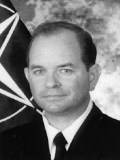As captain of the USS John F. Kennedy, patroling the north Arabian Sea, Ronald H. Henderson Jr. '76 has been directly involved in the American military effort in Afghanistan. "It's 107 degrees here, and there are 5,000 American men and women busting their asses on this ship to protect our country," he reported not long ago.
 |
| Ronald Henderson, USN |
Henderson joined the navy as a curious 21-year-old, fresh from college and eager to try something new. "I was interested in international relationsI thought about going into the CIA, the Foreign Service, or working at the UN," he recalled. Then he heard about the naval aviation program and signed up for a six-year stint. "My father was in the navy for a short time and it seemed to be an exciting career option," he explained. "Some people find it curious that I'm from Harvard, since there aren't a lot of Harvard grads in the military. There were actually five guys from my class who joined naval aviation." He was promoted to captain in 1998.
The Kennedy, one of 13 aircraft carriers in the U.S. fleet, is Henderson's second ship and third command: after leading a squadron of jet fighters, he was assigned the amphibious assault ship USS Juneau, based in Sasebo, Japan. Originally, he was not slated to take over the Kennedy until this October. "When I was assigned the position in February"he took command in a ceremony conducted at sea"it was a bit of a shock," he admitted. "I was kind of thrown into the middle of things, but it all worked out."
Henderson and his family know that the unexpected is part of his job. "One of the toughest things," he said, "is missing family birthdays and all the holidays." (Missing last year's twenty-fifth reunion, Henderson wrote in his class report, was "regrettably appropriate.") Navy vessels are normally deployed for six months, but Henderson didn't expect to get home before September. In his absence, his wife leads a support group for fellow Kennedy spouses that helps left-at-home husbands and wives manage "being separated from loved ones for such long stretches of time."
 |
| The USS Kennedy has been on duty in the Arabian Sea. |
| United States Department of Defense |
Last year Henderson wrote in his class report that he had found naval service "extraordinarily challenging and equally rewarding....I have witnessed the sacrifices of those who serve in our armed forces and marveled at their patriotism, hard work, and dedication, usually for little tangible reward." His College roommates, he noted, have supported him all along. But he has seen a distinct change in other people's attitudes since September 11. "I got e-mails from lots of classmates soon after the tragedya lot of them from people I didn't even know, people I had to look up in my freshman facebookthat said, 'We never really met, but I just wanted to say that I respect and appreciate all that you're doing.'" The events of September 11, Henderson said, forced Americans to realize that "we are vulnerable, and the nation sleeps soundly at night only because there are people out there working to protect the country."





